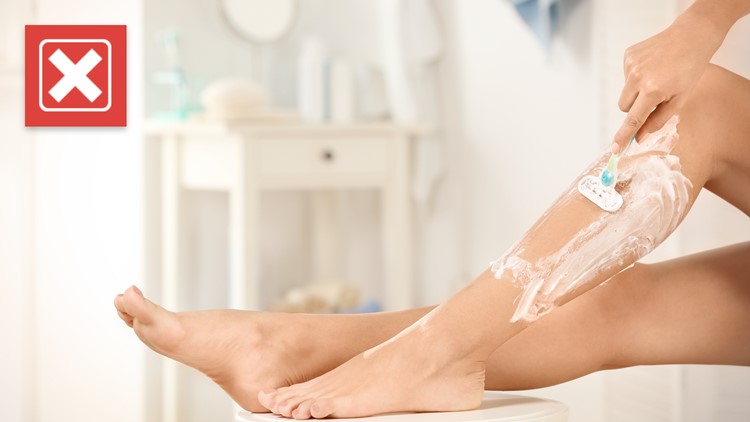Have you ever heard of the old wives’ tale that shaving your hair can make it grow back thicker?
Many people online believe it to be true — but does shaving really make your hair grow back thicker? We VERIFY what’s true and what’s false.
THE QUESTION
Does shaving make your hair grow back thicker?
THE SOURCES
- Cleveland Clinic
- Mayo Clinic
- Healthline
- Article published in the British Medical Journal (BMJ)
- Adam Friedman, M.D., professor and chair of dermatology at George Washington University School of Medicine and Health Sciences
- Sara Lamb, M.D., assistant professor of dermatology at Virginia Commonwealth University
THE ANSWER
No, shaving does not make your hair grow back thicker.
WHAT WE FOUND
Shaving does not make your hair grow back thicker or faster, dermatologists at the Cleveland Clinic, Mayo Clinic, and Healthline all say. This is a myth that has been disproved by strong scientific evidence for many years, according to an article on medical myths published in the British Medical Journal (BMJ).
“When you shave, it does not change the thickness of the hair,” said Sara Lamb, M.D., an assistant professor of dermatology at Virginia Commonwealth University.
It appears that this belief has been passed down from generation to generation and the article published in the BMJ says it is often reinforced by popular media sources. It was first debunked in 1928 when a clinical trial showed that shaving had no effect on hair growth. More recent studies have also confirmed that shaving does not affect the thickness or rate of hair regrowth, the researchers who wrote the article said.
Shaving gives the hair a blunt tip, which might feel coarse or “stubbly” for a while as it grows out, according to the Mayo Clinic. During this phase, the hair may appear darker or thicker than before, but it’s really an illusion.
“There's no biological basis for shaving to cause the hair to come back coarser or to come back thicker,” Adam Friedman, M.D., the chair of dermatology at the George Washington School of Medicine and Health Sciences, told VERIFY.
On its website, the Cleveland Clinic explains that each hair on your body grows from its own hair follicle, which is a tube-like structure surrounding the root and strand. When you shave, you cut your hair at the shaft or the visible part of the hair that sticks out of the skin — but that does not impact the actual root of the hair, which is located beneath the surface.
Friedman says that hormonal influences, medical problems, medications and even things people put on their skin, including topical retinoids for acne or anti-aging products, can potentially affect how hair grows and its thickness, but he says shaving itself does not have the same impact.
“I think there are things that we can do to influence the thickness and the appearance of the hair,” Friedman said. “But I think just simply shaving typically doesn't do that.”
Friedman and the Cleveland Clinic recommend following the tips below to prevent irritation and get a closer, smoother shave:
- Exfoliating first
- Shaving with cool water in the direction of the grain
- Using a multi-blade razor with a lubricating bar
- Shaving with a gel or a non-foaming shave cream
- Applying moisturizer right after showering to combat stubble



